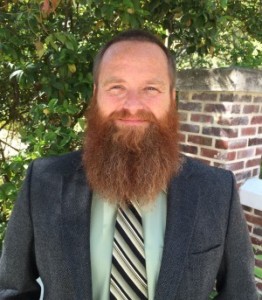
Brad Stoddard is an Assistant Professor of Religious Studies at McDaniel College in Westminster, Maryland. He completed his dissertation at Florida State University, and he is currently revising his manuscript on Florida’s faith-based correctional institutions. He teaches American religious history and the history of Christianity. His primary research interests include religion and law, religion and American prisons, and theory and method in the study of religion. He is currently at the start of his term as President of the North American Association for the Study of Religion.
See bradstoddard.com for more information.
"Religions are belief systems", "Religions are intrinsically violent", "Religion is Bullshit"... these are just some of the pervasive cliches that we might hear from time to time in the English-speaking world about our central topic of discussion on the RSP, 'religion'.
In this podcast, Judith Weisenfeld talks to Brad Stoddard about her new book, New World A-Coming: Black Religion and Racial Identity during the Great Depression. In this book, Weisenfeld explores several social groups in the early 1900s who combined religious and racial rhetoric to fashion new identities.
By claiming the invisible not simply as a materialist term but a metaphysical one as well, Harriss contends that despite—or even because of—his status as a thoroughly “ secular” novelist and critic, Ellison’s writing reflects important theological trends and issues that mark his age and the cultural inheritances of his literary production.
Ever wonder what it's like to complete the dissertation to first book process? How people find publishers? How much the publisher and editor influence the project? This podcast offers a roundtable discussion where six scholars discuss these questions and more. All six published some version of their dissertation, and they have unique insights and anecdotes to help explain and illumine this process.
Religious freedom is an inherently good thing, right? It’s a cherished idea that is easy for state governments to enact, no? In this interview, Finbarr Curtis questions both of these assertions. In The Production of American Religious Freedom, Curtis argues that religious freedom is a fluent and malleable concept that people deploy for various and competing reasons.
In this interview with Brad Stoddard, Professor Eric Mazur discusses a variety of issues relating to religion and law in the USA, such as the evolving state of First Amendment jurisprudence, the Religious Freedom Restoration Act, dominant trends in the study of religion and American law.
In this interview, Russell McCutcheon and Aaron Hughes discuss the North American Association for the Study of Religion (NAASR), an international organization dedicated to historical, critical, and social scientific approaches to the study of religion. In this interview, Russell McCutcheon and Aaron Hughes discuss the North American ...
Rousas John Rushdoony might be one of the most important Christian theologians you've never heard of. In this interview, Professor Michael McVicar discusses Rushdoony and Christian Reconstruction. McVicar gained unprecedented access to Rushdoony's personal files, ...
In this interview, Jason Josephson discusses the Japanese appropriation of the modern category of "religion." He first describes how Shinto is typically represented in EuroAmerican religious studies courses. He then describes the various actors and processes (both European and native)...
Professor Bruce Lincoln from the University of Chicago discusses a variety of topics including werewolves, critical theory, pedagogy, and self-imposed estrangement from the academic study of religion. In this interview, Professor Bruce Lincoln from the University of Chicago Divinity School discusses a variety of topics including werewolves, critical theory,
This work is licensed under a Creative Commons Attribution- NonCommercial- NoDerivs 3.0 Unported License.
The views expressed in podcasts, features and responses are the views of the individual contributors, and do not necessarily reflect the views of The Religious Studies Project or our sponsors. The Religious Studies Project is produced by the Religious Studies Project Association (SCIO), a Scottish Charitable Incorporated Organisation (charity number SC047750).